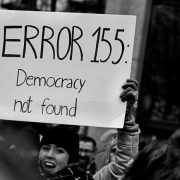Between October 1787 and April 1788, a series of 77 articles were published in New York City newspapers to promote the ratification of the newly created Constitution of the United States. Each of the thirteen states would hold a Constitutional Convention to ratify or reject it, and a minimum of nine states would need to approve it in order to form a new government. The author of these essays, to which 8 more were added when they were compiled into a book, now known as The Federalist Papers, was none other than Publius.
Publius, also known as Publius Valerius, was one of four ancient Roman aristocrats who led the overthrow of the Roman monarchy in 509 BC, helped create the Roman Republic, and was elected the first of two Roman Consuls. The Republic lasted nearly 500 years until it was destroyed by the dictatorship of Julius Caesar. The pseudonym was chosen as a response to a series of articles against the ratification of the Constitution published under the pseudonyms Cato and Brutus, and later dubbed the Anti-Federalist Papers. It is believed that the Anti-Federalist papers were written by Founding Fathers Patrick Henry, George Clinton, Richard Henry Lee, Mercy Otis Warren, Samuel Bryan, and others.
The exact attributions are not known, but they were all credible and heartfelt defenses against centralized government power. For example, Mercy Otis Warren was a correspondent and adviser to the likes of George Washington, John Adams, Patrick Henry, John Hancock, Thomas Jefferson, and Samuel Adams. Besides her historical account of the American revolution, she published a series of poems in 1790 under her own name, which was highly unusual for a woman to do at the time.
Republicanism versus Democracy
In Federalist 10, considered the most consequential of the Federalist Papers, Publius makes the case against direct democracy and the factionalism it incites. In it he expresses his contempt for majority rule at the expense of the natural rights of each individual. The Founders’ experience under the Articles of Confederation convinced them that people with similar interests and resources should not be able to rule as a mob.
Publius describes the Constitution as a “happy combination” of a republic and democracy. “The great and aggregate interests being referred to the national, the local and particular to the State legislatures.” The result of this is American style Federalism, a decentralized governmental structure, that as Publius explains, would make it “more difficult for unworthy candidates to practice the vicious arts by which elections are too often carried.”
One of the Anti-Federalist criticisms is that centralized government over a large territory couldn’t succeed, failure would result in the rise to power of an autocratic ruler, and revert to an oppressive regime. In Federalist 14, Publius argues that this is not possible in a republic that has three branches of government, each with its own responsibilities and powers, and with checks and balances over the others. What Publius does in this case is to refute the Anti-Federalist argument that relies on the thinking of the French political philosopher Montesquieu by using Montesquieu’s own solution to the problem.
Bill of Rights or No Bill of Rights
In our postmodern world, the debate over the Bill of Rights is about the efficacy of each of the first ten Amendments individually. Freedom of speech is under attack by the political correctness elites, the right to bear arms is under attack by state media and their elected minions, illegal search and seizure is under attack by the surveillance state, and the tenth amendment, the one that reserves powers not enumerated in the Constitution to the States, aka Federalism, has been effectively abrogated.
However, in 1787 the debate was over the need for a Bill of Rights at all. As Publius writes in Federalist 84:
I go further, and affirm that bills of rights, in the sense and in the extent in which they are contended for, are not only unnecessary in the proposed constitution, but would even be dangerous. They would contain various exceptions to powers which are not granted; and on this very account, would afford a colorable pretext to claim more than were granted.
The fear was that if specific rights were enumerated, they would be the only rights that were protected, and that government could expand its powers to control behavior that was not specified in the Constitution. While the Bill of Rights eventually passed – this was necessary for ratification – the foresight is extraordinary.
The Publius writers are Poetic Justice Warriors with all of the character traits – reason, purpose and pride. Those who dismiss the relevance of the Constitution in our postmodern world have but a fraction of the intellect or character of Publius. Or as historian Richard B. Morris explains, in the essays that make up The Federalist Papers, Publius has created an “incomparable exposition of the Constitution, a classic in political science unsurpassed in both breadth and depth by the product of any later American writer.”
Original Intent
There is a lot of debate these days about how the Constitution should be interpreted. Do we consider it a ‘living document’ whose meaning changes according to the whims of the political majority, as the progressive movement insists, or do we interpret it according to the meaning of the words as they were written, also known as constructionism and originalism? But at the beginning of the Constitutional Convention there was no original intent, many delegates were there to fix the Articles of Confederation, and others like Publius understood the need to scrap the Articles and start over. After four months of debates, compromises, and draft copies, all while sequestered in the sweltering heat of Independence Hall, the new Constitution was perfected and ready to go on the road for ratification by the States.
Unanimous consent was existential for the new republic in order to insulate the union from foreign powers, and Publius knew this. These eloquent political philosophers were the first Chief Justice of the Supreme Court John Jay, the first Secretary of the Treasury Alexander Hamilton, and the father of the Constitution James Madison. And as poetic justice would have it, their principles, compromises, meticulous language, and most important of all, their incredible understanding of human nature, paved the way for the abolition of slavery four score and seven years after the Declaration of Independence. Or as escaped slave (and advisor to President Lincoln) Frederick Douglass put it:
I hold that the Federal Government was never, in its essence, anything but an anti-slavery government. Abolish slavery tomorrow, and not a sentence or a syllable to the Constitution need be altered. It was purposely so framed as to give no claim, no sanction to the claim, of property in man. If, in its origin, slavery had any relation to the government, it was only as the scaffolding to the magnificent structure, to be removed as soon as the building was completed.













